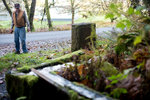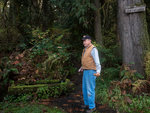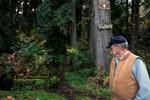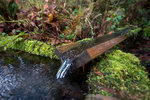






TOLEDO — After considerable effort, it turns out that even the long and ever-reaching arm of the government can’t keep water from running downhill.
The Wales Spring has burbled out of a cedar shrouded hillside in east Toledo since 1885. During that time, the spring has wet the whistle of many locals, livestock and out-of-towners alike. Dating back to the late 1990s though, the Lewis County Public Health Department has been angling to have the roadside spring shut down, going so far as to threaten the owner of the spring, Reuben Herndon, with fines of up to $5,000 per day.
The freshwater spring was first tapped and brought to the roadside by Herndon’s namesake step-grandfather, Reuben Wales. Located at the bottom of Wales Hill, northeast of Layton Prairie outside of Toledo proper, the spring can be seen cascading down the hillside through a series of above ground wooden aqueducts before spilling into a hollowed out cedar log that serves as a cistern. Just feet away, high up on a cedar tree that has grown tall and swollen from the abundance of water at its feet, is a sign posted by the county that declares the water unfit for drinking.
In spite of that caustic warning, Herndon, 84, says the spring still provides water to the three houses on the historic Wales family farm. Persistent, convention-bucking fans of the spring regularly disregard the warning signage and indulge in the forbidden temptation of the countryside.
“People still come out and dip water out of that tank, which the county doesn’t like too much, but what are you gonna do?” noted Herndon, who has nonetheless had to make a number of concessions in order to pacify the county and keep the spring running at all.
Herndon moved to the family farm in the 1990s in order to care for his elderly aunt, Florence Wales. Florence’s father, Reuben Wales, was originally from Canada before moving to Iowa at the age of 21 and then following the Oregon Trail out to the West Coast. He finally settled in Toledo in 1885 when he purchased a 69-acre tract of land from the railroad in order to try his hand at the timber-choked farming life of the Pacific Northwest.
“The farm became very famous around here for growing hops because it employed so many people in the fall for harvesting,” said Herndon, who noted that the farm has gradually increased in size up to its current holdings of 175 acres. The hops are gone, replaced by cows, but the spring remains.
According to Herndon, and Wales family history, Reuben Wales built up the spring infrastructure during his very first year along the south shore of the Cowlitz River.
“It’s been here ever since … They used the water here domestically during all of that time and it's been used here ever since,” said Herndon. “The spring was open and a lot of the people who live up the river from me tell me that they used to get their water from here, and they still did up until they closed it. A lot of people get their water here because the water in the wells out here can be pretty scarce and a very rusty.”
The lore of the historic family well is something at Herndon, who grew up in Nebraska, was steeped in from an early age.
“My mother used to talk about the spring. She just loved it when she lived here … She always said it was good water and everybody in the valley was using it,” said Herndon. “The water from the spring tastes very good. It’s probably the best water I’ve ever tasted, and lots of people tell me the same thing.”
One of those people is Herndon's neighbor, Bill Davis, who resides in the far reaches of Evans Road where it hits the Cascade foothills east of town. Davis has been a frequent spring imbiber since 1946 when his family moved to the area. He used to work in the summer helping Herndon’s Aunt Florence with putting the hay up in the barn. He fondly recalls rejuvenating afternoon swims in the pond on the property that is formed by the many springs that pop out of nearby Wales Hill. Up and through that time, Evans Road was a single-lane dirt road, and a trek to town was nearly a full-day affair that would leave both horses and horsepower employers with parched lips and hot motors.
“It was always open to the public and there was never any problem with it. It just always seemed like it would run forever,” said Davis. “Everybody used to stop there and get water. There was always a tin ladle hanging on a tree there on a nail and you could always count on getting a good drink of cool water.”
Davis noted that most of the wells in the area are tinged with iron and have to be heavily treated. He said that growing up in the rural reaches of the county his family learned to stockpile against hardship and always made sure to keep a large metal tank on the back porch that they kept brimmed with freshwater from the Wales spring. Even as an adult, Davis has used the spring to get by when his water source failed and his family had no other readily accessible water source.
Davis told of a time in 1993 when he had the Culligan water man come out to his place to help set up a new water system. According to Davis, the Culligan employee said he’d stopped by the Wales spring on his way out Evans Road, tested it and found it to be better than anything his company was filtering and bottling.
“I accused him of stopping and filling up his tanks,” said Davis with a laugh.
Once Lewis County came in with threats of legal action against Herndon and his family, though, the free-flowing, carefree days of Wales spring were numbered.
“It was really nice to have back then. It was used by a lot of people and there were plenty of folks upset about (the county’s action) but we couldn’t do anything about it,” said Davis, who still sees the occasional unfamiliar face filling up a bootleg bottle from the roadside spring. “You’ll see them every once in a while. I’ve seen people with jugs who are getting water, but it used to be easier.”
Just start poking around with the locals and you’ll find an upswell of sepia-toned memories like those Davis shared. One overgrown country boy who grew up in the area told tales of riding bikes with his pals down steep Wales Hill in the summertime and then challenging each other to see who could sit submerged in the frigid cold spring-filled cistern the longest. Rumor has it nobody ever made it too long, but it was all the fun a hayseed country child could imagine just to try.
“People used to come down and set up their lawn chairs and just sit there and relax and listen to the water gurgle,” said Herndon.
The visitors would come from as far as Portland and Seattle.
“My aunt told me that there was gentleman from Olympia who would drive down with gallon milk cans and fill them up for his water supply all throughout the summer,” said Herndon. “A lot of people would come down with gallon milk jugs or even bigger containers just in their station wagons or pickups. There were a dozen people using it very regularly at that time.”
Herndon says that around 2003 there was a serious drought that put the homes of the surrounding hillsides in a precarious water pinch. Luckily, the water of Wales spring was still there for them to use.
“There were a number of people from up on the hill that ran out of water in their wells and they would come down here with big 350-gallon tanks in their trucks so they could water their cows and horses, and domestic tanks as well,” said Herndon. “I live in the mobile home right by the spring and a lot of times I’d hear them in the middle of the night. They’d be headed to Portland or Seattle for work and they’d stop there to fill up their jugs before heading out, sometimes between 3 and 5 o’clock in the morning.”
Records from the county indicate that as of 2008 as many as six cars per day were still stopping by the spring for refreshment and restocking.
Despite all of those precious percolating memories and 131 years of living testament to the spring’s pure virtues, the Lewis County Public Health Department is less than enamored by the homespun water system.
“Basically the deal is, I know a lot of people use that as a water source, but we just can’t say it’s an approvable water source because it’s just a spring that flows out onto the ground,” said Bill Teitzel, a supervisor at the Lewis County Public Health Department.
A mysterious case of giardia from 1996 that was loosely linked to Wales Spring seems to be the genesis of the county’s opposition to public access. Notes from that case report indicate that water from the spring was trucked to a wedding reception at the Alpha Grange hall in Onalaska where an attendee wound up with a case of, as the report reads, “beaver fever.”
From that point, Herndon says that the county has been determined to limit, and ultimately close off, all access to the spring. In the years that followed, the county conducted numerous water quality tests at the spring, which they say contained some bacteria, plant matter and microscopic “animalcules.” No E. coli was ever found in the samples, but the county contends that the open source spring constitutes a danger to public health.
Herndon, though, isn’t buying what the public health crusaders are selling. He still drinks the water on a daily basis and says it’s not the water quality that has changed over the years, just the government’s standards and requirements. Herndon says that because more than 50 people per week were deemed to be using the open water supply, the government decided that it qualified as a Class A water company. The upkeep of a public water supply, according to county documents, was quoted to Herndon as $48,000 up front with $19,000 worth of maintenance per year. In the absence of starting up his own water works company, Herndon said he was given an ultimatum by the county to cap and disassemble the spring or face a recurring fine of $5,000 per day.
“I argued with them for awhile and finally decided that it wasn’t worth it to risk it,” said Herndon, who through a begrudging willingness to budge on the issue was eventually able to arrive at the middle ground of ambiguity, like a spring beneath a bed of ferns, under which the water still runs today.
“Their solution was we could take down the cistern and put it in a park down in Centralia or Chehalis. But I said, ‘Well that doesn’t mean anything to anyone there,’” said Herndon. “It’s very meaningful to our family and to the people of the valley here ... If you take this away, it’s like taking half the farm away from me, or more.”
Instead of exporting such an important piece of Toledo and Wales family history to one of those big city parks, Herndon proposed his own alternative, and much to his surprise, the county relented.
Today, the water flows out of the hillside and down a wood plank aqueduct before spilling into a cedar horse trough that makes it difficult, if not entirely impossible, to capture the water in a cup or jug. Next to the trough stands a stoic stone memorial to Rueben Wales and his namesake spring that was erected by Florence Wales in 1990. The county’s non-potable water sign, which has been torn down by unknown vigilantes on numerous occasions over the years, hangs ominously over the otherwise serene setting.
“They did allow me to at least make that cedar trough and put that up for the historic value,” said Herndon. “I think that the way it is is probably as good as I can see it. It kind of depicts the way that it originally was. I imagine (Reuben Wales) had a cedar log down there for a tank.”
Herndon explained that as part of the cleanup he was forced to remove a concrete water tank that had sat at the site since 1952.
“I understood from the notes that I read that (the tank) was put in by the county. I didn’t know that at the time that the county wanted me to shut it down, so I wound up doing all of that work, when they could have done it themselves,” noted Herndon. “I always thought that was kind of ironic. But I’m glad that it happened the way that it did so that they didn’t come out and just rip it out of the ground.”
Regardless of his concerted and sustained efforts to keep the site as open and accessible to the public as possible, Herndon says there are still some locals in the area who hold a grudge against him for failing to adequately assert the proper level of “Don’t Tread on Me” country principles in the face of authority.
“There were some people who expressed quite a bit of anger at me for not fighting the county harder on it but they sent me a letter that was pretty serious,” admitted Herndon. “They were angry that it was being shut down. There was a couple of them who said they would have fought it, but they weren’t the ones facing financial disaster.”
As it stands, Herndon is happy to have preserved as much of his family’s long flowing legacy as possible, and he has no plans of giving up the good fight.
As he inspected the cedar cistern trough and wood-peg aqueduct for repairs he intends to make next summer, Herndon paused and insisted that, “As far as I’m concerned, it will stay here the rest of my life.”